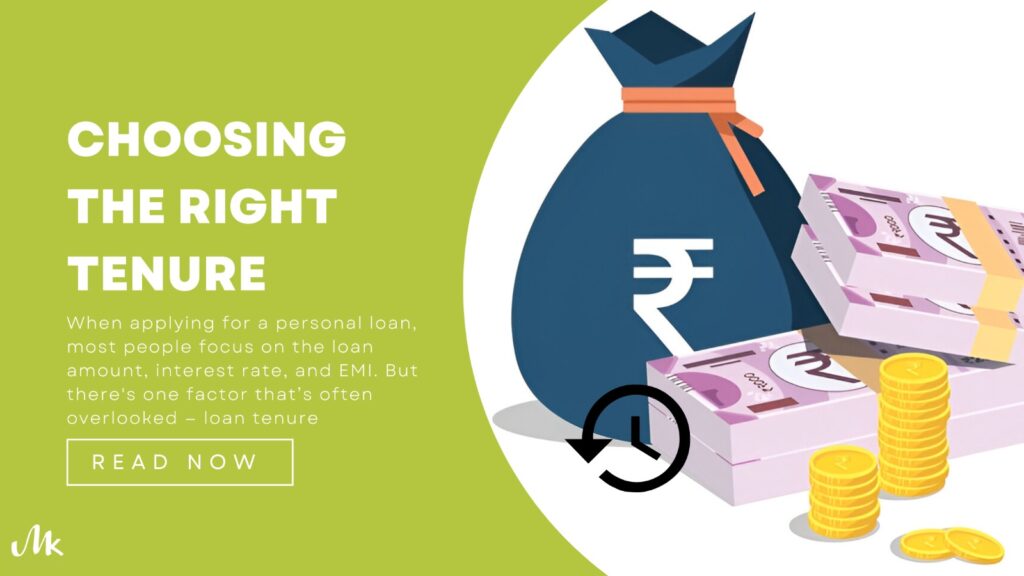🕒 How to Choose the Right Loan Tenure for Your Budget

SHORT-TERM VS. LONG-TERM PERSONAL LOAN — WHICH OPTION SUITS YOU BEST?
When seeking a personal loan, numerous people mainly concentrate on two aspects: the amount they can secure and the interest rate provided. Though these are undoubtedly significant factors, another essential element that greatly impacts your financial ease is the loan duration.
Loan tenure signifies the entire period during which you opt to repay the loan through consistent monthly installments (EMIs). Generally, the duration for personal loans varies between 12 and 60 months. The tenure you select directly influences the amount of your monthly EMIs, the cumulative interest paid throughout the loan’s duration, and how easily the repayment aligns with your financial plan.
How can you establish the ideal loan tenure for your unique financial circumstances? The response varies based on multiple factors, such as your earnings, present costs, upcoming financial objectives, and your ease with lasting financial obligations. Let’s examine both immediate and extended personal loans thoroughly to assist you in making a well-informed choice
WHAT OCCURS WHEN YOU OPT FOR A BRIEF TENURE (1–2 YEARS)?
A short-term personal loan usually indicates a loan duration of one to two years. In this situation, you agree to repay the loaned sum, plus interest, in a reduced timeframe. This inevitably leads to increased EMIs, since the overall repayment is distributed over fewer months. Nonetheless, the benefit is that you incur much lower overall interest compared to loans with longer terms.
This kind of loan is perfect for borrowers with a steady and adequate income who feel capable of handling higher monthly payments. Choosing a short term allows you to pay off the loan rapidly and achieve debt freedom sooner. This premature debt repayment not only brings tranquility but can also benefit your credit score, improving your chances for future credit.
As an example, let’s take a personal loan of ₹2,00,000 with an annual interest rate of 12%. If the repayment period is fixed at one year, your EMI would be around ₹17,770. Throughout the year, you would ultimately pay around ₹13,000 in interest overall. This indicates that the total repayment sum stays fairly low, making it economical.
Nonetheless, the primary disadvantage is that the monthly EMI can be rather high. For people with restricted disposable income, current EMIs, or erratic financial responsibilities, this type of repayment scheme could pressurize their finances. Thus, short-term loans are ideal for those who possess solid financial stability and few simultaneous debts
WHAT OCCURS WHEN YOU SELECT A LONG DURATION (3–5 YEARS)?
Conversely, a long-term personal loan denotes a repayment schedule of three to five years. This arrangement significantly lowers the monthly EMI, since the repayment duration is extended over additional months. Consequently, long-term loans are easier for borrowers with moderate incomes, family costs, or various financial commitments to handle.
In the same scenario of a ₹2,00,000 loan at 12% interest, if the loan period is extended to five years, the EMI decreases to approximately ₹4,450. Although this reduced monthly payment provides more flexibility in handling expenses, it results in greater total interest costs. In five years, you might pay around ₹67,000 in interest — over five times the interest accrued on a one-year loan.
Even with the increased interest, long-term loans are frequently chosen for their affordability. They enable borrowers to comfortably cover their routine expenses, prevent financial strain, and continue leading a balanced lifestyle. Nevertheless, the prolonged term implies that the loan stays in effect for years, which could impact your capacity to secure further loans or engage in long-term financial investments.
DIVERGENCE BETWEEN SHORT-TERM AND LONG-TERM TENURE: ESSENTIAL DISTINCTIONS
The essential trade-off when evaluating short-term versus long-term personal loans is between monthly payments and overall expense. Short-term loans can decrease total interest and enable quicker debt freedom, yet they demand solid financial discipline to handle the increased EMIs. Extended loans, though easier to handle each month, lead to considerably higher interest costs in the long run.
For borrowers with substantial income and minimal obligations, brief tenures provide both ease and cost savings. On the other hand, individuals with fluctuating incomes or elevated monthly expenses might consider longer durations more beneficial, even with the increased expense.
SELECTING THE APPROPRIATE LOAN TENURE FOR YOUR PERSONAL LOAN
Choosing the appropriate loan term is a choice that ought to depend on your existing financial situation and future objectives. Prior to making a choice, it’s important to consider several crucial questions:
What is my income per month, and how steady is it? A consistent income can enable larger EMIs and a shorter repayment term, whereas an unstable or restricted income might require an extended repayment duration.
Am I currently facing any financial obligations? If you are currently handling costs like rent, family responsibilities, or ongoing EMIs, an extended tenure might assist in keeping stability.
Do I want to decrease the overall interest paid or lessen my monthly payments? A brief term aids in reducing interest costs, while an extended term offers flexibility in your monthly finances.
Is it possible to pay off the loan early before the term is over? If your lender permits prepayment without fees, you could select a longer term initially and pay off early when you’re financially ready.
Is achieving quick debt freedom more important to me, or do I prioritize financial flexibility at this moment? This individual choice frequently influences the decision to choose a brief or extended duration.
By critically assessing these questions, you can select a loan arrangement that promotes your financial well-being and future goals instead of introducing unwanted stress
CONCLUDING REMARKS: HARMONY IS ESSENTIAL
Selecting between a short-term and a long-term personal loan involves more than merely picking a duration. It’s about recognizing your existing financial situation, preparing for upcoming obligations, and making a knowledgeable choice that advantages you both in the present and in the future.
A brief tenure might seem more appealing because of reduced interest expenses, but this is true only if your salary permits larger EMIs. A more extended term, while more expensive over time, could provide the financial freedom and reassurance you require at present.
In the end, the ideal loan duration is one that ensures your financial stability, minimizes emotional stress, and aligns strategically with your personal and career goals.

